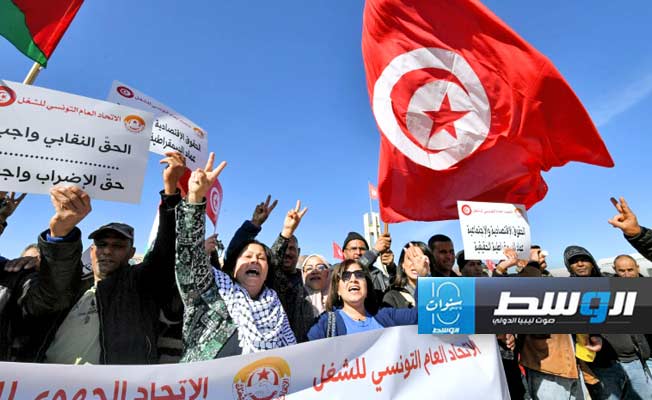Tunisia Secures $1.2 Billion Trade Finance Loan Amid Economic Struggles
In a move to bolster its economy, Tunisia has obtained a substantial loan from the Islamic Trade Finance Corporation, signaling trust in its ongoing reforms.
Published April 30, 2024 - 16:04pm

Image recovered from alwasat.ly
Tunisia has signed a $1.2 billion loan agreement with the Islamic Corporation for Trade Finance (ICTF) for a term of three years aimed at supporting government institutions facing structural challenges. The agreement was signed amidst the annual meetings of the Islamic Development Bank group held in Riyadh from April 27 to April 30. The Tunisian Ministry of Economy stated on Monday that the loan would be dedicated to financing imports of essential materials such as crude oil and petroleum products by some public companies.
Government agencies in Tunisia, approximately a hundred, have been facing financial and structural crises for years. The economy is suffering from persistently high inflation rates for the past two years, averaging 10% annually, compounded by sometimes threefold price increases for food items. This has led to a deterioration in the conditions of the working and middle classes. In 2023, Tunisia's economic growth reached a mere 0.4%, impacted by a five-year-long drought. The national debt, both internal and external, is now approaching 80% of the Gross Domestic Product (GDP).
President Kais Saied last year rejected a preliminary deal with the International Monetary Fund (IMF) for a new $2 billion loan, arguing that the fund's recommended reforms, such as restructuring state-owned enterprises and gradually removing subsidies on certain products, were impositions that threatened the country's social peace. Despite these challenges, Tunisia managed to repay its debts last year, benefiting from a resurgence in tourism and a significant increase in remittances from Tunisians abroad.
Securing international loans and grants has become imperative for Tunisia as it faces a public finance crisis, resulting in shortages of food and fuel according to government critics. The country's economic woes have been compounded by political unrest, armed attacks hurting the vital tourism sector, the COVID-19 pandemic, global commodity shortages due to the war in Ukraine, and the added strains from climate change's negative impacts on food security, energy, and the environment.
To manage these difficulties, the Tunisian Parliament authorized the central bank earlier this year to provide exceptional financing facilities to the public treasury. Financial experts, however, express concerns over prospective inflationary effects and the potential devaluation of the Tunisian dinar. Meanwhile, international agencies like Moody's have voiced concerns about the country’s refinancing risks in the absence of comprehensive external funding. Looking ahead to 2024, Tunisia's public debt servicing is expected to rise substantially, a trend that places further financing needs on a nation struggling to alleviate its economic crises.
The ICTF loan presents a vital lifeline for Tunisia's economy, providing critical support for the North African country as it grapples with severe economic hurdles. The funding will play a key role in mitigating some of the immediate financial pressures by safeguarding the continuity of essential imports.
To ensure the resilience of its economy, Tunisia has been actively seeking diverse international partnerships and funding sources. This proactive approach to securing financial aid and fostering investment from global institutions underscores Tunisia’s recognition of the perilous state of its economy and its commitment to avert further deterioration.
On the domestic front, Tunisia is aiming to implement reforms to enhance its economic framework and attract foreign investment. These reforms are designed to improve the business climate, foster job creation, and promote sustainable development, particularly in impoverished regions where marginalization and unemployment have fueled social discontent.
The socioeconomic struggles facing Tunisia are characteristic of broader challenges within the region. Many North African economies are caught between the imperatives of political reform, economic liberalization, and the preservation of social stability. For Tunisia, which sparked the Arab Spring movement over a decade ago, the road to economic recovery is proving to be a complex and arduous journey.
Internationally, Tunisia's economic situation has drawn attention from stakeholders concerned about regional stability and migration patterns. The European Union, among other international entities, is closely monitoring the situation, acknowledging that Tunisia’s economic health is intrinsically linked to broader regional security and prosperity.
To stave off a looming crisis, Tunisian authorities are not only ramping up their search for international financial support but are also exploring internal mechanisms for boosting revenues. These measures include potential tax reforms, improving the efficiency and transparency of public spending, and minimizing fiscal evasion.
The gravity of Tunisia's financial situation necessitates swift action and careful strategic planning. As the country looks towards future loan repayments and a tenuous economic recovery, the collaboration with ICTF and other international financial institutions may form the cornerstone of Tunisia’s path to stability. Nonetheless, without substantial economic reform and a conducive environment for growth, long-term prosperity remains uncertain. Tunisians are watching closely as their government navigates these unprecedented financial straits, hopeful that the measures taken will secure a more stable and prosperous future for the nation.



:quality(70)/cloudfront-eu-central-1.images.arcpublishing.com/irishtimes/SV5HVQWI7BV6H65746THQB7QAM.jpg)



